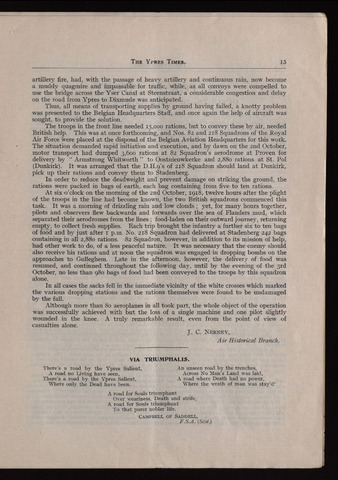The Ypres Times.
15
artillery fire, had, with the passage of heavy artillery and continuous rain, now become
a muddy quagmire and impassable for traffic, while, as all convoys were compelled to
use the bridge across the Yser Canal at Steenstraat, a considerable congestion and delay
on the road from Ypres to Dixmude was anticipated.
Thus, all means of transporting supplies by ground having failed, a knotty problem
was presented to the Belgian Headquarters Staff, and once again the help of aircraft was
sought, to provide the solution.
The troops in the front line needed 15,000 rations, but to convey these by air, needed
British help. This was at once forthcoming, and Nos. 82 and 218 Squadrons of the Royal
Air Force were placed at the disposal of the Belgian Aviation Headquarters for this work.
The situation demanded rapid initiation and execution, and by dawn on the 2nd October,
motor transport had dumped 3,600 rations at 82 Squadron's aerodrome at Proven for
delivery by Armstrong Whitworth to Oostnieuwkerke and 2,880 rations at St. Pol
(Dunkirk). It was arranged that the D.H.g's of 218 Squadron should land at Dunkirk,
pick up their rations and convey them to Stadenberg.
In order to reduce the deadweight and prevent damage on striking the ground, the
rations were packed in bags of earth, each bag containing from five to ten rations.
At six -o'clock on the morning of the 2nd October, 1918, twelve hours after the plight
of the troops in the line had become known, the two British squadrons commenced this
task. It was a morning of drizzling rain and low clouds yet, for many hours together,
pilots and observers flew backwards and forwards over the sea of Flanders mud, which
separated their aerodromes from the lines food-laden on their outward journey, returning
empty, to collect fresh supplies. Each trip brought the infantry a further six to ten bags
of food and by just after 1 p.m. No. 218 Squadron had delivered at Stadenberg 242 bags
containing in all 2,880 rations. 82 Squadron, however, in addition to its mission of help,
had other work to do, of a less peaceful nature. It was necessary that the enemy should
also receive his rations and at noon the squadron was engaged in dropping bombs on the
approaches to Gulleghem. Late in the afternoon, however, the delivery of food was
resumed, and continued throughout the following day, until by the evening of the 3rd
October, no less than 980 bags of food had been conveyed to the troops by this squadron
alone.
In all cases the sacks fell in the immediate vicinity of the white crosses which marked
the various dropping stations and the rations themselves were found to be undamaged
by the fall.
Although more than 80 aeroplanes in all took part, the whole object of the operation
was successfully achieved with but the loss of a single machine and one pilot slightly
wounded in the knee. A truly remarkable result, even from the point of view of
casualties alone.
J. C. Nerney,
Air Historical Branch.
VIA TRIUMPH ALIS.
There's a road by the Ypres Salient,
A road no Living have seen,
There's a road by the Ypres Salient,
Where only the Dead have been.
An unseen road by the trenches,
Across No Man's Land was laid,
A road where Death had no power,
Where the wrath of man was stay'd'
A road for Souls triumphant
Over weariness, Death and strife,
A road for Souls triumphant
To that purer nobler life.
campbell of saijdell,
F.S.A. (Scot.)

